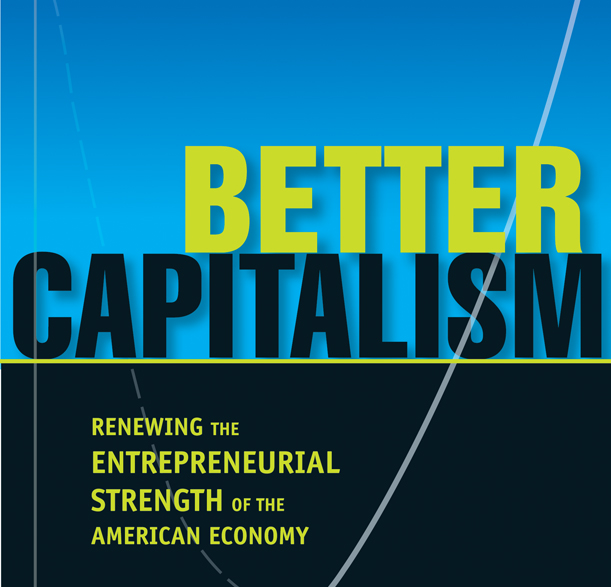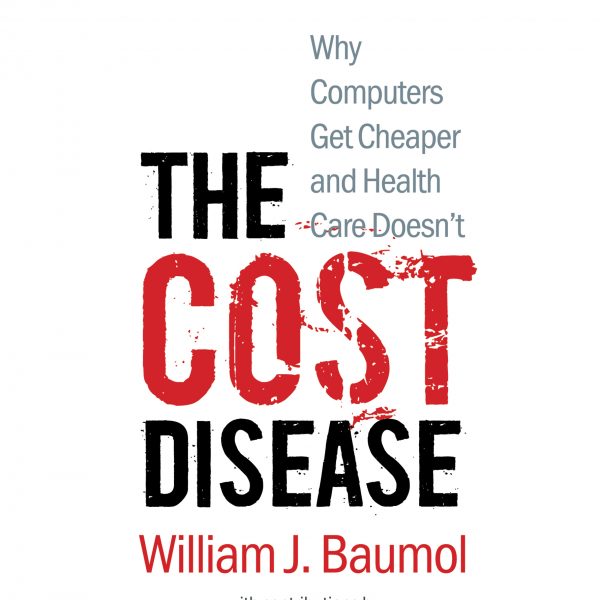Better Capitalism: Renewing the Entrepreneurial Strength of the American Economy
What is the future of capitalism in the wake of the Great Recession? Traditional macroeconomic tools have not worked to correct listless economic growth and high unemployment like economists believed they would—and some have blamed this on a fundamental failure in ‘capitalism’ itself. But are there different brands of capitalism from which we can choose?
 In the book they co-authored with William Baumol, Good Capitalism, Bad Capitalism, Robert E. Litan and Carl J. Schramm first proposed that sustaining rapid growth in the economy hinges on a combination of entrepreneurial and managerial capitalism. The former is described as “the one that accounted for the proliferation of new “gee-whiz” products, technologies, and services introduced by a seemingly never-ending supply of new firms,” while the latter pertains to the large, multinational companies responsible for stimulating rapid growth with their domestic and international expansion. Three years later, in the aftermath of the Great Recession, Litan and Schramm now argue in Better Capitalism: Renewing the Entrepreneurial Strength of the American Economy that we need an even greater emphasis on entrepreneurial capitalism. It is the “micro underpinnings of our economy” that deserve the greatest attention; the proliferation of brand-new, radical technologies, products and services; the invention of new therapies and devices that will change the lives of billions. Boldly and ambitiously, Litan and Schramm call for nothing less than an “entrepreneurial revolution.”
In the book they co-authored with William Baumol, Good Capitalism, Bad Capitalism, Robert E. Litan and Carl J. Schramm first proposed that sustaining rapid growth in the economy hinges on a combination of entrepreneurial and managerial capitalism. The former is described as “the one that accounted for the proliferation of new “gee-whiz” products, technologies, and services introduced by a seemingly never-ending supply of new firms,” while the latter pertains to the large, multinational companies responsible for stimulating rapid growth with their domestic and international expansion. Three years later, in the aftermath of the Great Recession, Litan and Schramm now argue in Better Capitalism: Renewing the Entrepreneurial Strength of the American Economy that we need an even greater emphasis on entrepreneurial capitalism. It is the “micro underpinnings of our economy” that deserve the greatest attention; the proliferation of brand-new, radical technologies, products and services; the invention of new therapies and devices that will change the lives of billions. Boldly and ambitiously, Litan and Schramm call for nothing less than an “entrepreneurial revolution.”
So how exactly can the growth of these early-stage, high-growth companies be stimulated? Without resorting to the conventional macroeconomic answers of spending more money or cutting tax rates, Litan and Schramm propose a series of creative measures:
- Fix university research departments
We normally think of universities as bastions of knowledge, dedicated to the traditional functions of research and teaching. But this overlooks their commercial contributions. Litan and Schramm highlight the “rock star entrepreneurship” that has emerged out of research departments and given us commercially valuable innovations such as medical devices and procedures. If the commercialization of these technologies can be accelerated, economic growth would follow.
- Give green cards automatically to foreign students who come to the States for STEM degrees
“Significant achievements in U.S. history are directly tied to skilled immigrants,” assert Litan and Schramm. In fact, without them, achievements like The Manhattan Project, the first helicopter and the first nuclear submarine would never have been accomplished in America. Neither would famous brand names like Coor, Heinz, Kraft, Procter & Gamble and Pfizer exist. So why are political hold-ups still impeding the economically viable evolution of immigration policy, when reforms would bring the U.S. so much more benefit?
- Make all cars “flex vehicles”
As the authors point out, the only reason why there is an oil monopoly is that there exist no feasible substitutes for it. If it were mandatory for all cars to run on multiple fuels like alcohol, ethanol and methanol, our dependence on OPEC would decrease radically. Such moves toward sustainable growth would facilitate entrepreneurial activity because it would then operate in harmony with environmental agendas.
- Change the K-12 curriculum to teach people to “manage themselves as if they were a business”
If the rewards of the entrepreneurial revolution are to be shared fairly, opportunities must remain open to those who are not inheritors of privilege. According to Litan and Schramm, this is best accomplished “by impressing upon all people, from the earliest possible age, that they are entrepreneurs who control their destinies.” Every American must have the chance to earn his lot in life. After all, as the authors powerfully observe, “That has been America’s history. It is also America’s destiny.”
For more post-Great Recession commentary on the economy, check out Schramm’s contributions to The Atlantic’s Ideas Roundtable as he analyzes the current labor market.
























